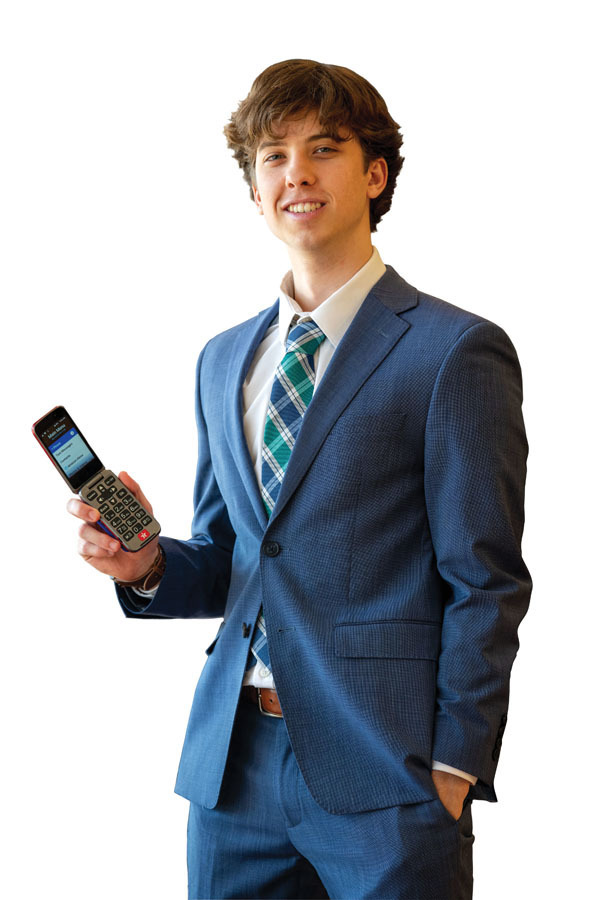Josh Haskell tried everything to reduce the amount of time he spent on his smartphone. He quit social media, set strict screen-time restrictions and even tried putting the cracked screen of his ancient iPhone 8 in black-and-white mode to make it less attractive.
Those tricks worked for a while, then he found himself slipping. An app would remind him how many hours he lost every week to his electronic sidekick. It bothered him. He didn’t want to be a smartphone zombie.
One day in early 2022, the accounting major bought a simple flip phone. And he’s never looked back.
Haskell’s phone is similar to those that hit peak popularity in the late 1990s, before smartphones became must-have devices for the 85 percent of Americans who own one today. The flip phone allows Haskell to make and receive calls, text, and take photos and videos. That’s it.

Last fall, he wrote an essay in The Observer about the results of his flip phone experiment. At the time, he didn’t know any other Notre Dame students who didn’t have smartphones. Now he can name maybe a half-dozen undergraduates who have flip phones, at least some of whom were influenced by his essay.
“What motivated the switch was me not being satisfied with the life that I was living with a smartphone,” says Haskell, a junior from Grand Rapids, Michigan. “I wanted to try something new, something that I’d thought about for a really long time.”
Haskell was in third grade when he got his first smartphone. He used it mainly for gaming and keeping in touch with his parents and siblings. During high school, he used social media apps like Snapchat and Instagram to keep up with friends.
He quit social media when he started college, but says he still wasted way too much time on his phone. “I’d look through my photos, check my email or do all these other things I didn’t really care about. They weren’t enjoyable to me,” he says. Idly scrolling was an ingrained habit.
With the flip phone, he says, his life changed dramatically for the better. He suddenly had lots more time for all the things he wanted to do more than staring obsessively at a small screen. “I have this abundance of time and energy, mental energy that I can spend on other things,” he says.
He’s learning new songs on the guitar. He spends more time hanging out with his Stanford Hall dorm mates. He’s read about 20 books — for pleasure, not ones assigned for classes.
Haskell says he studies, prays, exercises and talks to family members more often and gets more sleep. He walks the dorm dog. He lingers over meals in the dining hall with friends.
He’s present in the moment, not subconsciously wondering what’s happening online and how soon he’ll be able to check.
“A lot of times, especially on breaks, it will be around 2 in the afternoon and I’ll realize I haven’t checked my phone all day because I’ve been so busy doing other things. Which is a crazy switch, because it used to be such an integral part of my life,” he says.
The flip phone isn’t mesmerizing. “It takes forever to type on it. It’s not fun and it’s not satisfying to look at. But that’s great, because when I need it to communicate, it’ll do that and it’s just a bare minimum,” he says.
Often, instead of texting, Haskell will call a friend. And friends have gotten in the habit of calling him, too. Personal conversations have replaced brief messages and emojis.
“My close friends call me a lot. They’re very used to it. I think a lot of other people still find it kind of strange,” he says, laughing.
Not counting phone conversations, Haskell estimates he’s on the phone between 5 and 30 minutes a day on his flip phone. That’s hours less than the daily average Americans spend on their smartphones.
His younger brother, who attends Franciscan University of Steubenville, has a flip phone, too. Last fall, Franciscan began piloting “Unplugged Scholarships” — $5,000 in annual tuition assistance for students who give up using a smartphone during their undergraduate years.
Among young adults today, fear of missing out — FOMO for short — is a thing. Many constantly check social media sites to see what their peers are doing, thinking and feeling.
Not Haskell. He doesn’t use social media even on his laptop. “I honestly forget it exists,” he says.
He has no plans to return to smartphone life. “I think my social life is more vibrant than it has ever been,” he says. “And I’m closer with my friends and having more fun.”
Margaret Fosmoe is an associate editor of this magazine. Contact her at mfosmoe@nd.edu or @mfosmoe.